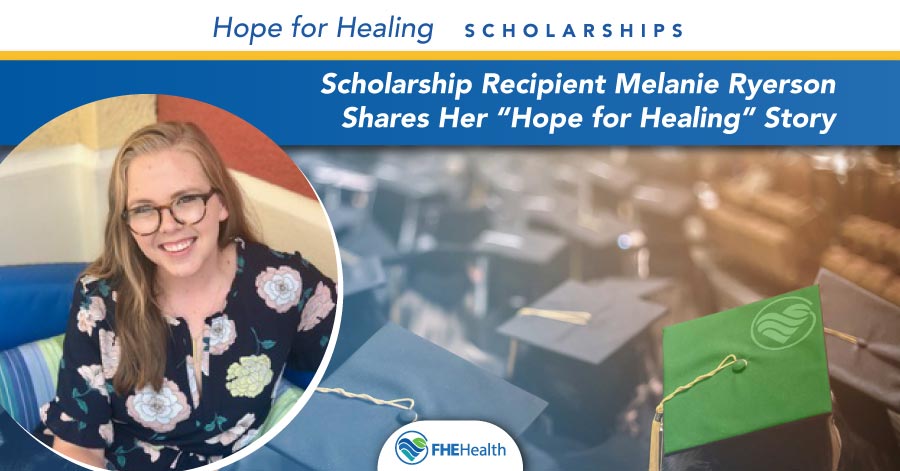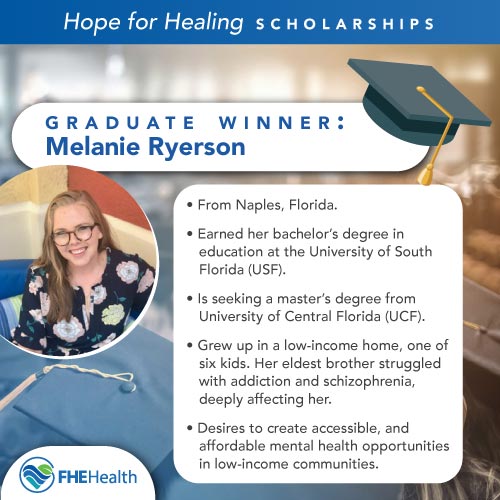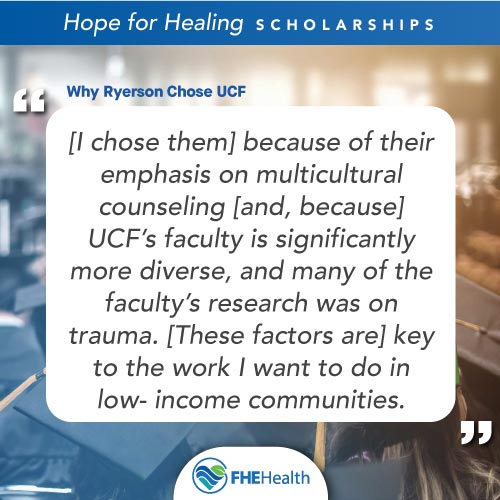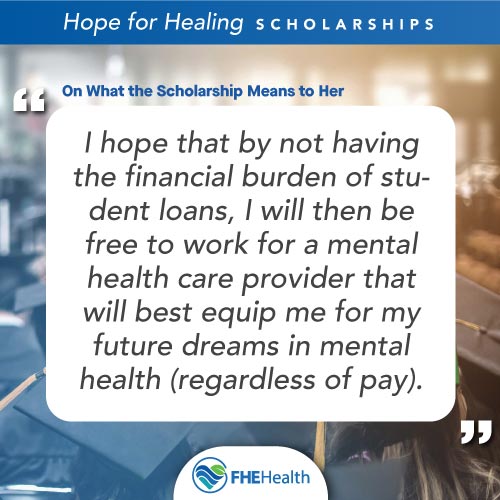
When Melanie Ryerson, the graduate recipient of this year’s Hope for Healing Scholarship, shares her story, “resilience” is a recurring theme. In her personal essay, the special education teacher and master’s student in clinical mental health counseling referred to something Dr. Martin Luther King, Jr., reportedly once said, as a guidepost for understanding her own life path: “The ultimate measure of a man,” King wrote, “is not where he stands in moments of comfort and convenience, but where he stands at times of challenge and controversy.”
How Facing and Overcoming Life Challenges Forged Resilience and Self-Growth
 Ryerson has certainly faced and overcome many challenges:
Ryerson has certainly faced and overcome many challenges:
- She grew up in a low-income home. This meant she and her siblings were “‘at risk’ of poor physical health, mental illness, incarceration, dropping out of school, and many other factors that did not reveal our truest potential,” in Ryerson’s words.
- When Ryerson was 12, her eldest brother—who by this time had been struggling with addiction—began to have episodes of paranoia and hallucinations. Ultimately, her brother’s attempts to self-medicate schizophrenia would end tragically. In Ryerson’s junior year of high school, her brother died from a prescription overdose.
- His death belonged to “an extensive family history of trauma, poverty, addiction, and mental disorders,” according to Ryerson.
- Sexual abuse and trauma, and their mental health impact in the form of anxiety and depression, were still other challenges with which Ryerson contended.
Finding Healing from Anxiety, Grief and Sexual Trauma
Ryerson is able to be candid about these “personal experiences of anxiety, grief recovery, and sexual trauma,” because these have been formative building blocks towards achieving her dream of one day serving low-income neighborhoods as a mental health counselor. And, with each challenge, she was able to “be grateful for the little mercies and the ways in which I was learning to thrive, so I clung to a sense of hope that everything would work out.”
Ryerson is equally candid about the things that helped her heal and the people who were most influential in helping her find recovery— from “family members to the many women who pray for me.” She credits three women in particular for encouraging her to pursue a vocation in counseling. They include:
- a grief mentor who led her grief support group;
- a women’s ministry leader who was instrumental in her healing process and mentored her in leading groups;
- and, the mental health counselor who, in Ryerson’s words, “gave me the courage to name my desire to transition into the mental health field and continues to mentor me throughout the graduate program process.”
The Challenges and Opportunities of College for a First-Generation Student
 Born and raised in Naples, Florida, Ryerson left for college in Tampa at the age of 18. She went on to earn a bachelor’s degree in education at the University of South Florida (USF). As one of six kids, she is the first and only child in her family to have obtained a college degree.
Born and raised in Naples, Florida, Ryerson left for college in Tampa at the age of 18. She went on to earn a bachelor’s degree in education at the University of South Florida (USF). As one of six kids, she is the first and only child in her family to have obtained a college degree.
College presented its own challenges for a “first-generation student” who had to contend with “finances, study habits, responsible decision making, taking out too many loans, just learning a lot about the university system without having family members who had done it before me.”
But attending USF was also a “game-changer” in various ways. “It opened me up to so many people from diverse backgrounds,” “really nurtured my faith,” and “gave me the space I needed to process everything leading up to college.”
In this last sense, college was also where she would begin to address the wounds of her past and find healing.
“One key factor that I believe helped me endure the challenges of my grief and trauma as I navigated college was a [ministry] support group for college women who had a history of sexual abuse,” Ryerson wrote in her essay. “This support group was the first opportunity I had to look at my own experiences and hurts. I finally was given language to address the shame I experienced growing up in a chaotic home. I also gained empathetic friendships that have been a safe place for healing. I later became a leader with this ministry to facilitate support groups and conferences for others.”
How the Ongoing Work of Healing Inspired Her Academic and Vocational Aspirations
Participation and service in this ministry lay the groundwork for more healing opportunities that would inspire Ryerson to pursue a master’s in clinical mental health counseling.
“To me it feels like life continues to take different puzzle pieces and arrange them together in a way that I continue to make meaning in and purpose from,” said Ryerson of that formation. She pointed to “three significant healing experiences” that led her to her current aspirations:
- At 21, I participated in a sexual abuse recovery group for college women and I found the group experience profoundly significant in drawing me out of denial and giving me language to address my shame.
- At 23, I participated in a grief support group where I was the youngest person to have experienced two immediate family losses, and again felt deeply cared for in a time when I felt significant despair. That is where I learned the importance of the grieving process and how critical it is to heal (in many areas of life).
- At 25, the initial ministry that sponsored the sexual abuse recovery group paid for my personal counseling. There I received the support of a gifted counselor to address my growing anxiety and to process the nuances of my past grief and trauma.
“All three healing experiences were all led by women of faith who had shared similar experiences and were eager to take the time to express empathy and share wisdom to help me heal, forgive, and ultimately thrive,” Ryerson said.
Attending a Counselor Education Program at UCF Ranked in the “Top Ten” by U.S. News
Ten years after graduating from college, having nurtured an interest in the mental health needs of at-risk youth and families in low-income neighborhoods, Ryerson moved to Orlando for graduate school at University Central Florida (UCF).
Ryerson said she chose UCF’s counseling program “because of their emphasis on multicultural counseling”— and, because “UCF’s faculty is significantly more diverse, and many of the faculty’s research was on trauma.” These factors are “key to the work I want to do in low- income communities,” Ryerson said.
UCF’s Counselor Education program was the clincher, though. The program was reportedly ranked among the top ten programs in the nation by U.S. News & World Report.
How Teaching Prompted a Search for Mental Healthcare Solutions in Low-Income Neighborhoods

Meanwhile, Ryerson has continued her full-time work as a middle school special education teacher. She is in her sixth year of teaching in low-income schools, an experience that has taught her more about the complex relationship between poverty, education and mental health:
Teaching in low-income schools has really taught me about how complex the various systems that support poverty are. Poverty is impacted by education, health care, the justice system, current and generational trauma, so for me it simply came down to … which one of those systems would I feel the most fulfilled working and … most confident that I can make an impact.
Most of my students with disabilities are high-functioning, so no one in the general public would know they have a disability … although their chronic struggles in education are partly due to their difficulties with academics, it is undeniable that my students have behaviors that result from trauma: poor self-esteem, withdrawal, outbursts, and difficulty with self-regulation.
Over the last five years, it is clear that as a teacher, I have to lay a strong social-emotional foundation before deep learning can even happen. My students continue to amaze me with how much they can do without even addressing their trauma. I can’t help but dream of who they will become, especially if provided caring support and tools to navigate life.
Working in this environment prompted Ryerson to think of a more holistic solution to the intractable systemic problems that so many of her students face. She described that solution as a “holistic wellness model” for low-income communities, based on at least two premises:
- that mental healthcare must address “mind, body and spirit;”
- and, “that the solutions to our mental health care barriers are already within our low-income communities and that as professionals we need to provide space and opportunities for community members to express their needs and contributions.”
Ryerson’s Future Contribution to the Mental Health Field: A Holistic Wellness Collective for Under-Resourced Communities
In addition to creating “accessible affordable mental health opportunities” in these neighborhoods as a Licensed Mental Health Counselor, Ryerson wants to “create a social enterprise that would include multiple for-profit options, as well as fundraising partnerships, to provide exceptional mental health care in low-income neighborhoods.”
Within this model, clients would meet with an intake specialist who assesses their needs and goals in a holistic way and then pairs them with the appropriate support people, from counselors, social workers, mentors and community advocates, to personal trainers and social justice workers, to peer support groups, group counseling, and other community resources— “all in a culturally competent manner.”
In the same vein, when Ryerson considers what she hopes will be her biggest contributions in the field of addiction and mental health, she said her “greatest hope” is to make this “dream of a wellness collective become a reality … to participate in the healing of local individuals and communities in Florida.”
How the Hope for Healing Scholarship Will Help
How will the Hope for Healing Scholarship help Ryerson achieve these dreams and goals?
“The Hope for Healing Scholarship is assisting me toward my goal of being debt-free on my 30th birthday,” she said. “I hope that by not having the financial burden of student loans, I will then be free to work for a mental health care provider that will best equip me for my future dreams in mental health (regardless of pay).”
She added: “Words cannot describe how significant this scholarship is to make my dreams a reality, as well as affirming both the growth I have experienced and the growth I am currently experiencing. Thank you, FHE Health, for your support and encouragement!”






